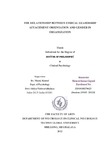Please use this identifier to cite or link to this item:
http://archive.nnl.gov.np:8080/handle/123456789/412| Title: | The relationship between ethical leadership attachment orientation and gender in organization |
| Authors: | Gajurel, Mahesh Kumar |
| Keywords: | Leadership Ethical leadership Attachment theory |
| Issue Date: | 16-Jan-2018 |
| Abstract: | Due to the high number of business scandals involving unethical leadership practices, organizations are becoming concerned about characteristics ethical leaders possess. Previous research studied mainly meri and has indicated that more securely attached leaders were more effective leaders. However, there remains ·a gap in the current literature regardjng ethical leadership and attaclunent orientation as this relates to gender. Based on attachment theory, the purpose of th.is quantitative study was to understand how variations in leaders' attachment orientation and gender predict ethical leadership. A convenience sample of 45 employees, with at least one employee per leader, along with 33 leaders with at least 6 mo1iths experience in a leadership position, completed the Experiences in Close Relationships Scale (ECR) and the Ethical Leadership Scale (ELS), respectively. The attachment scores from leaders found to he ethical (score of 3 or higher on ELS) were analyzed using a simultaneous regression analysis and analysis of variance. The regress.ion findings were not statistically significant. However, the analysis of variance results suggested that those with a secure orientation scored significantly higher on the ELS than those in the avoidant and anxious categories, and that the interaction between gender and attqchment category significantly affects a leaders mean score on the ELS. Findings from this research help clarify how attachment style and gender may affect ethical leadership orientation. This study enhances and promotes social change initiatives by providing organizations with information on how attachment orientation and gender may be related to ethical leadership behaviors which may be used durit:i.g hiring to work toward hiring an ethical workforce. |
| Description: | Thesis submitted for the Degree of Doctor of Philosophy in Clinical Psychology, the Faculty of Arts, Department of Psychology In Clinical Psychology, Techno Global University, Shillong, Meghalaya, 2012 |
| URI: | http://103.69.125.248:8080/xmlui/handle/123456789/412 |
| Appears in Collections: | 600 Technology (Applied sciences) |
Files in This Item:
| File | Description | Size | Format | |
|---|---|---|---|---|
| Thesis Mahesh Gajurel.pdf | 25.35 MB | Adobe PDF |  View/Open |
Items in DSpace are protected by copyright, with all rights reserved, unless otherwise indicated.